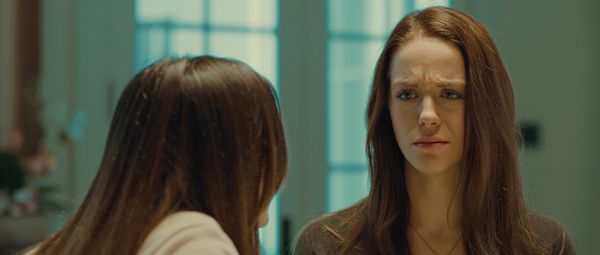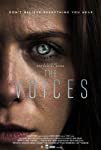Eye For Film >> Movies >> The Voices (2020) Film Review
The Voices
Reviewed by: Jennie Kermode

Somewhere under the mountain of bad ideas that combine to make up The Voices, there was probably what seemed like a good one. If blind people's hearing becomes more acute, could that mean that they are sometimes able to hear voices from the spirit world, inaudible to others? If we ignore the fact that the enhanced hearing thing is a myth and allow for the possibility of a spirit world because this is, after all, genre fiction, that seems to have something, but it is extrapolated into a story with spectacular clumsiness.
If one believes in souls, one might reasonably ask, as our heroine does, when they first enter the body. Traditionally Catholics and Evangelical Christians believe they do so at conception, Jews and many other types of Christian believe they do so at the first breath, and Muslims believe they do so after 120 days of gestation. There is an older idea, however, with roots in the Abrahamic religions, which hold that they do so when the foetus' heart first beats. Hinging a film on this presents a narrative challenge because the heart starts beating around three to four weeks after conception, and it's quite hard to confirm that a pregnancy exists before that point, let alone pack in a lot of angst and action. Nevertheless, The Voices goes for it, with its young, blind heroine, Lilly (played by sighted actress Valerie Jane Parker, who looks so skinny that one imagines she might struggle to conceive), getting a confirmatory scan and then spending several days, or weeks, struggling to decide which of several spirits which are petitioning her she ought to allow to inhabit her child.

Let's set aside the fact that this model for acquiring souls is flawed on several levels (not least because there are more people alive today than there have ever been, if you add them all up across the centuries, in the past) and focus on the bigger problem here: at no point does it ever occur to Lilly that her child might have a soul of its own, either inherent or predestined. She simply doesn't worry about the ethics of letting a dead person possess her child as long as it's not an evil dead person (there are no chainsaws in this film but taking one to the script might have helped). Instead, she wrestles with her big decision whilst enduring gaslighting from her frankly awful boyfriend Tom (Chris DeBlasio) and getting tangled up in a Sixth Sense-style subplot concerning a five-year-old girl who went missing years ago. Those responsible for the disappearance are so obviously Bad People that they could be in pantomime.
With a set-up like this, you wouldn't expect much sensitivity to issues around blindness, which is good, because you won't get it. What makes this more uncomfortable is that writer/director Nathaniel Nuon clearly thinks he understands, as he tries to point up the ways in which Tom, an architect who designs buildings for disabled people (whom are treated as having a uniform set of needs), both exploits and fails to understand Lilly's impairment whilst passing himself off as a hero. There's real potential in this portrayal but it's squandered because Nuon treats his heroine in many of the same problematic ways. She's positioned as being so vulnerable to predatory men that only luck and her special ghost-talking powers keep her alive, and we see her cheerfully accept things that most blind people would not put up with, such as people taking her arm and leading her around without first allowing her to express where she wants to go. Her blindness is constantly centred in contexts where it has little if any relevance to what's going on.
So we have blindness, and pregnancy, and ghost-talking, and then Nuon sees fit to layer in half a dozen additional story threads which, given that he struggles to fully develop even one of his characters, leaves us having to deal with so many underwritten people that it's hard to keep track. Some of the acting is just atrocious. There's a scene in which Tom ushers a visitor out of the house and one wonders if it's all in-character or if DeBlasio was just so appalled that he had to get the guy offscreen as quickly as possible. He, to be fair, is adequate in his role, having more to work with than any of the others. Parker is so busy performing blindness that she barely registers on any other level, except when required to express horror or frustration, which emotions one imagines might well have been easy to access in this situation.
Are there any saving graces? Well, the film is prettily shot in places and there are moments when the awkwardness between Lilly and Tom produces some genuinely interesting drama. Every time this happens, however, there's a hasty reset and we're back to the assumption that she'll follow him around no matter what he does. If you're a fan of ghost stories then you might find that some of the ideas appeal to you, if not so much their execution. There are parts of the film which successfully hit the so-bad-it's-good sweet spot and provoke inadvertent laughter, and its overly complicated plot at least means that there's always something happening. Overall, though, the most compelling reason to watch this film would be if you're making one of your own and you want to know what not to do.
Reviewed on: 02 Apr 2021
















